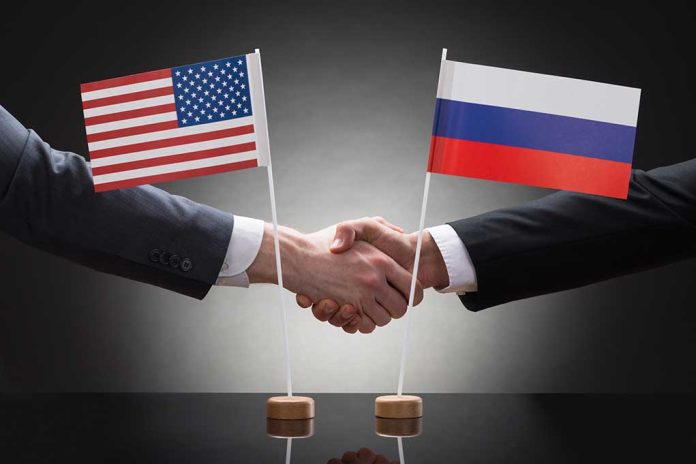
Russia dangles economic opportunities to the US in Ukraine peace talks while continuing to pursue territorial ambitions that threaten Ukrainian sovereignty.
Key Takeaways
- Russia and Ukraine have agreed to a limited Black Sea ceasefire focused on halting attacks on energy infrastructure, with Russia linking the deal to the lifting of US sanctions.
- Presidents Trump and Putin have discussed “enormous economic deals” including joint ventures in Arctic exploration, space projects, and energy cooperation that would require sanctions relief.
- Experts warn that economic concessions to Russia without addressing its military objectives could encourage further aggression rather than promote lasting peace.
- Russia’s growing economic and diplomatic ties with China complicate any potential US-Russia economic agreements and raise questions about Moscow’s long-term intentions.
- US coordination with G7 partners is seen as critical before making any decisions on lifting sanctions against Russia.
Black Sea Ceasefire Deal: A First Step or False Promise?
The United States recently announced a ceasefire agreement between Russia and Ukraine focusing on the Black Sea region and halting attacks on energy infrastructure. This diplomatic initiative marks the first significant attempt by the Trump administration to broker peace in the ongoing conflict. However, concerns have emerged about the differing interpretations of the deal between Washington and Moscow, with Russia explicitly linking the agreement to relief from US-imposed sanctions.
National security experts remain divided on the ceasefire’s potential impact. While some view it as progress toward peace, others caution against premature concessions. The limited scope of the agreement, focusing only on specific infrastructure targets rather than a comprehensive settlement, raises questions about its effectiveness in addressing the broader conflict.
Trump's fulfillment of his vow to end the horrific war in Ukraine advances even further, as Russia and Ukraine agree to cease all fighting in the Black Sea and finalize their deal to not attack energy infrastructure.
Biden/Harris never tried diplomacy.https://t.co/b2pTKCXyox
— Glenn Greenwald (@ggreenwald) March 25, 2025
Economic Deals at the Center of US-Russia Negotiations
At the heart of the diplomatic engagement are potential economic agreements that could reshape US-Russia relations. During recent communications, Presidents Trump and Putin reportedly discussed “enormous economic deals” focusing on joint Arctic exploration, space projects, and energy cooperation. These proposals come as US-Russia trade has plummeted since Moscow’s 2022 invasion of Ukraine, falling from already modest levels to near insignificance under the weight of international sanctions.
“Putin is happy to talk up business opportunities with Trump because he knows that they are good buttons to press to distract the administration from Russia’s immediate goals in Ukraine,” says John Lough, associate fellow at Chatham House.
The economic overtures align with President Trump’s preference for transactional diplomacy, suggesting that lifting sanctions could open Russia’s economy to American business interests. Potential agreements might include restoring Russia’s access to global markets for agricultural and fertilizer exports, which would address certain Russian economic concerns while offering some benefits to global markets struggling with inflation.
Strategic Concerns: Russia’s True Intentions
Despite the economic proposals, analysts question Russia’s sincerity and strategic intentions. Moscow continues to pursue territorial ambitions in Ukraine while facing significant economic challenges domestically. Russia’s economy has become heavily reliant on military spending, with emerging issues including inflation and labor shortages that could worsen without new growth opportunities beyond the defense sector.
Security experts emphasize that Russia’s military objectives in Ukraine have not changed, despite its willingness to negotiate economically advantageous deals. Putin has praised Trump’s peace efforts while maintaining goals that threaten Ukrainian sovereignty, raising concerns that economic incentives might be used to extract diplomatic concessions without meaningful changes in Russia’s strategic posture.
International Dimensions: The China Factor
Complicating the US-Russia economic dynamic is China’s growing influence. Since Western sanctions were imposed, Russia has become increasingly dependent on China both economically and diplomatically. This relationship adds a layer of complexity to any potential US-Russia economic bargain, as Moscow may be reluctant to jeopardize its ties with Beijing in pursuit of improved relations with Washington.
American foreign policy experts suggest that the sustainability of improved US-Russia relations remains uncertain, with the Kremlin harboring suspicion about long-term US motives. Any major shift would likely require concrete agreements comparable to Cold War-era arms control deals, moving beyond economic incentives to address core security concerns.
“In Moscow, Trump is seen as an anomaly for the US establishment from whom it might be possible to extract some short-term gains,” explains Temur Umarov, a fellow at the Carnegie Russia Eurasia Center.
Coordinating with Allies: A Critical Consideration
As discussions progress, analysts stress the importance of US coordination with G7 partners before making decisions on sanctions relief. The path forward remains uncertain, with economic opportunities and diplomatic challenges intersecting in complex ways. While economic engagement offers potential benefits, serious questions persist about whether such cooperation can lead to meaningful progress toward peace in Ukraine or simply provide Russia with economic relief while it continues pursuing territorial ambitions through military means.









